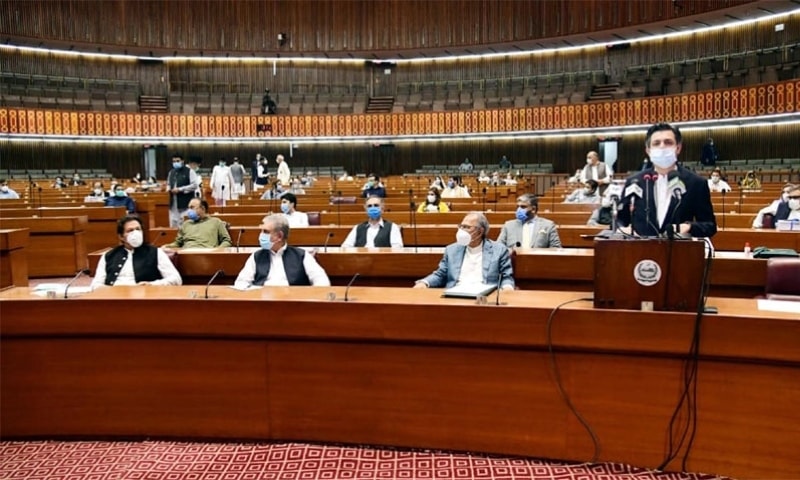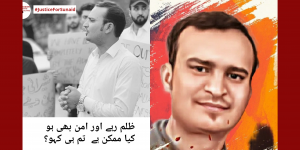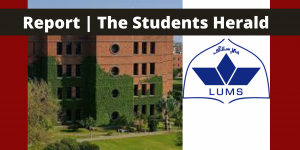Fahd Ali
Nobody really expected a radically progressive budget from the PTI government for the financial year (FY) 2021. Yet, nobody also expected what was presented on June 13 by Federal Minister for Industries and Production Hammad Azhar. Dubbed as the ‘Corona Budget,’ what most of us expected was a budget focusing on stimulating a contracting economy, a large intervention by the federal government in the agriculture and health sectors, and an expanded social security net. What we learnt on June 13 instead was the extent to which this government is beholden to the diktats of the IMF. Azhar proudly stated that the government intends to stay in the IMF’s program in the FY2021. This essentially means another year of austerity and expenditure cuts, government’s claims notwithstanding.
Let us look at the revenue situation first. The target in the coming financial year is Rs4,963 billion, which is 27 percent more than what the government actually hopes to collect by the end of FY2020. In normal circumstances one may have praised the government’s effort to aim for the sky. These, however, are far from normal circumstances. The FY2020 tax collection fell woefully short of what government intended to collect in the year. The budgeted target for tax collection in FY2020 was a whopping a Rs5,555 billion but the government fell short by almost 30 percent and collected only Rs3,908 Billion. To expect that they would now be able to collect 27 percent more in the next year is nothing short of being delusional. The sources that we depend on for our tax collection will be extremely constrained in the coming year making it harder for the government to collect this target. Most of our tax collection comes from indirect taxes and within that we depend on sales tax and customs duties. Both these taxes rely heavily on economic growth. It is unlikely that the government will be able to achieve the target economic growth rate of 2.1 percent in FY2021, which would also mean that the government will most likely fall short of its revenue target again. Many already believe that this no-tax budget is only temporary, and we should expect a ‘mini-budget’ in the second quarter of FY2021 essentially consisting of revenue measures to shore up government’s finances. The decision not to levy new taxes in the proposed budget was a poor one. In the next financial year when the economy is more likely to contract than grow and still reeling from the pandemic, the need to redistribute wealth will become even more important. One tax that this government ought to have considered levying is a wealth tax on the (super) rich and monies received directed to the poor. This seems just as likely as this government taking any swift action against the sugar baron that it has so generously subsidized in the past two year of its rule.
Even if government’s revenue position is expected to stay poor it could have taken some important decisions on the expenditure front. One would be to actually freeze the defence expenditure and not just talk about it. The much-trumpeted freeze on the defence budget in FY2020 actually saw an increase of 6.5 percent and will see another increase of five percent in the FY2021. As opposed to this, expenditure on subsidies, general public services, and most importantly social has been cut. Benazir Income Support Program (BISP) that was expanded under the Ehsas Program because of the effects of the pandemic saw the government spending Rs243 billion as opposed to the budgeted Rs187 Billion in FY2020. The budgeted amount for FY2021 has now seen a decrease of 14.4 percent over the amount spent this year. This is truly appalling. The FY2021 will continue to be a tough year for the working class and lower middle-class families in the country. By government’s own numbers these families stand at a about 14 million households. Protecting these households in months to come must be any government’s priority and an even bigger BISP/Ehsas program ought to have been included in the budget for FY2021. Two other important aspects missing from the federal governments expenditure plans are interventions in the health sector and a plan to stimulate economic growth. First, by government’s own admission the health system in the country will be under considerable stress in months to come due to the corona virus pandemic. One would expect the government to give this due importance in its budget plans by expanding its expenditure on healthcare. True that healthcare is essentially a provincial subject, but provinces will be under considerable pressure to ramp up their spending in the next financial year given their finances depend a great deal on what the federal government collects through taxation. An expanded healthcare program that focuses on the working class/poor citizens of this country would have considerably reduced the precarity of the situation that these find themselves in the current times. Second, and arguably the most important piece missing from the government’s budget is a solid pro-poor economic growth plan for the FY2021. The government is expecting the agriculture sector to lead the economic growth in the next financial year, yet Hammad Azhar failed to give any strategy that this government has to fight the locust attack currently ravaging crops in the country’s agricultural heartlands. Unlike the pandemic, the government had prior signals about a looming locust attach in the country. Yet it failed to act in a timely manner, which now threatens to make the country food insecure. One fails to understand how this government expects the agriculture sector to lead the growth next year given the current situation.
To be fair, this government’s performance as far as presenting a poor budget is considered is no different from most (if not all) previous government. Yet this argument can only go so far in helping us understand the current situation. Whether they like it or not, PTI’s government is also faced with a crisis that this country has never seen before. This is an extraordinary situation that required a radical rethinking of our old priorities. So far the budget 2021 tells us that its business as usual.
The writer is an economist and a professor at ITU.
The Students’ Herald News Desk focuses on reporting the latest news regarding student politics and campus updates to you.
The News Desk can be reached at admin@thestudentsherald.com




